Affordable Housing Project in Croatia to be Run by Erste Group
August 6, 2022 - Living costs keep climbing in Europe, including housing and rent, and Croatia is no exception. With the government policies favouring tourist rentals, there is a shortage of any, especially affordable housing in the cities. While the government sleeps on the issue, private investors are quick to recognise a niche. Erste Group prepares to run an affordable housing project.
As Poslovni writes, the absence of a housing policy in Croatia has led to the absurd situation that the residential real estate market in Zagreb and larger cities is oriented toward tourist rentals, pushing up square footage prices, and making real estate unavailable to the local population with average income.
The profession keeps warning in vain about the problem and social repercussions, but it seems that private capital has recognised a niche in what should have been dealt with by policies.
The Austrian Erste Group has launched a strategic affordable housing project that will build 15,000 apartments in the region, including Croatia, and rent them out at affordable prices. The local project is still in its infancy, and the detailed outlines of the model should be clearer by the end of the year.
“The idea of realising affordable housing is very current in the environment of growing inflation and rising real estate prices in many European countries, including Croatia. In principle, there are positive examples in other countries, such as Austria, and such a model can be a good generator of cooperation between local administrations and banks, which contributes to ensuring a kind of social stability”, says the local Erste.
In Croatia, the bank has started preparations in this segment. "At this moment it is still too early for details, and it is to be expected that the bank will be able to share information with the public within a reasonable time, most likely towards the end of the current year", they told Poslovni. Unofficially, Poslovni has learned that the project could first come to life in Rijeka and then in the capital, but there is still a need to devise models and work out cooperation with local authorities.
In doing so, the regulatory framework that paved the way for implementation in other countries will be crucial. In Austria, with a long-standing tradition of affordable housing, about one billion euros was invested in about 6,000 apartments for rent. In the Czech Republic, the bank founded a separate company for the construction of affordable apartments, while in Slovakia, where the co-investor is the government, about 200 apartments in 2022. Similar projects in Hungary and Romania are in the preparation phase.
There are several open questions to which answers will be sought in the coming months, starting with an adequate model. For example, if it will be a public-private partnership or some alternative such as reserving building rights.
The legal framework should regulate the rental market and the mutual relations (and protection) of tenants and landlords because an unregulated market regularly tells horror stories about landlords and tenants from hell, where it turns out that the key factor in renting is luck. However, it will come down to taxes to ensure that the affordable rental price remains some 10 or 20 percent lower than the market price.
According to the income tax law, it is possible to penalise selling or renting to natural persons at prices lower than market prices (on which additional taxes and contributions are calculated), so the treatment of affordable rent should be regulated because it aims to be lower than the market price by definition.
Housing is a need
The interlocutors point out that there is no possibility of VAT deduction during construction (or acquisition) if the purpose is to lease for housing, which consequently inflates the value of the investment and rent.
With the current rental prices, which the profession points out as some of the lowest in the EU, developers are not interested in building apartments for rent due to long payback periods (20-30 years), which is why it will be difficult for the initiative of affordable housing to move from a standstill without the cooperation of the state and local units (from taxes to all other benefits).
Even though he has not yet seen the details of the model, Dubravko Ranilović from the real estate agency Kastel-Zagreb points out that Croatia has a specific problem that, for example, apartments are not available for young families who are not creditworthy. “In principle, we support all initiatives. We need social programs so that housing can be available to citizens because it is a need”, he says.
The market is flooded with apartments for rent, but tourist apartments. The number of tourism listings outnumbers long-term rentals by four times, with forecasts that the gap will still widen. Ranilović sees a partial reason for this in the preferential tax treatment, which has “created a tax oasis in the taxation of tourist rentals”, so apartments have expanded into residential areas, taking away part of the space in favor of short-term rentals, and the situation is further aggravated by subsidies.
Tax policy, which steadily pushes the country towards apartment building, is part of the puzzle of the lack of a meaningful housing policy.
The government is not abandoning the housing loan subsidy program despite criticism that it freezes prices (or even pushes them up) being available only to a small group of citizens, while all others (those with weaker creditworthiness, the elderly, or simply those who do not meet the prescribed tender conditions) have to pay a higher price.
The neglected middle layer
“The corporate segment recognised that with the current dynamics of the real estate market and the rampant prices, the middle class of society with incomes for which the price of new square meters and existing square meters of apartments are not affordable has been neglected.
This is a large segment of society, the demand is high and will remain so in the future, especially in Zagreb and university cities, and this is where Erste sees the creation of a new niche”, says Vedrana Likan of Colliers.
He detects the problem in the lack of regulation, pointing out that the domestic legal framework does not know the terms of affordable housing or, for example, housing accessible to the elderly population, and if this were regulated, the market would already recognise the opportunity.
“Affordable housing does not necessarily have to include new construction, a lot would be done if someone dealt with the existing housing stock”, believes Likan. Colliers' analysis, for example, shows that there are 7,074 apartments with an area of 410,600 square meters owned by the city of Zagreb and city companies alone, which could be used precisely for affordable and social housing.
For more, make sure to check out our dedicated business section.
Fatal Bus Crash in Croatia, 12 Polish Tourists Killed (Updated Report)
August 6, 2022 - A deadly traffic accident occurred around 5:40 a.m. on the A4 highway (Varaždin-Zagreb), when a bus with Polish registrations ran off the road.
Update at 8:15 pm: The Chief of the Varaždin County Police Department gave a statement to RTL Television this afternoon, explaining that one of the drivers has passed away, while they're still unable to determine who the other driver was or what his condition is. The police investigation at the scene of the crash is finished, and they've determined that the bus has swerved off the highway, and crashed into the ditch by the highway. He added that the police were able to talk to some of the passengers, and determined that most of them were asleep. It is also very difficult to get any specific information from them, as they're in a state of shock or in various types of trauma.
Update at 2:03 pm: The Večernji list daily brings the reporting from the Polish website rmf.pl, including the tweet by the Polish Infrastructure Ministry, which claims that the bus was made in 2011, and that it has gone through all the necessary inspections in June this year and was found to be in good condition. The bus left Warsaw yesterday morning, and their next stop was Jasna Góra in Częstochowie, where the pilgrims participated in a eucharist. During the night, they traveled through Czechia, Slovakia, Hungary and Croatia. They were supposed to get to Međugorje in the early afternoon hours. The plan was for them to return to Poland next Friday.
Update at 1:43 pm: Health minister Vili Beroš confirmed the numbers: in addition to 12 casualties, there are 32 injured passengers. 19 of those are seriously injured while 13 have less serious injuries. The injured passengers are in various Croatian hospitals, from Varaždin, Čakovec, and 4 hospitals in Zagreb. There was a total of 44 people on the bus.
Update at 11:33 am: Croatian Minister of the Interior, Davor Božinović, held a press conference at the site of the horrible accident, where he confirmed that additional people are fighting for their lives in various hospitals. He also added that from what the police and other rescue services were able to determine, there weren't additional people trapped underneath the bus. He confirmed that there were no children in the bus, adding: "There are only injured people, and those who lost their lives in this crash. Nobody was left unhurt."
Polish Prime minister Mateusz Morawiecki tweeted about the tragedy, confirming the close cooperation with the Croatian authorities.
2/2 O szczegółach tragedii rozmawiałem dziś rano z premierem Chorwacji @AndrejPlenkovic, który zapewnił o pełnym wsparciu chorwackich służb medycznych. Poleciłem naszym służbom konsularnym organizację wsparcia dla rodzin uczestników wypadku.
— Mateusz Morawiecki (@MorawieckiM) August 6, 2022
Update at 10:11 am: Zagreb Clinical Hospital has reported that another one of the injured passengers was declared dead after unsuccessful reanimation. The Polish Prime minister Mateusz Morawiecki and the staff from the Polish embassy in Zagreb reportedly confirmed that the bus was on its way to Međugorje.
According to the first information by the Croatian media, 11 people have died, and the number of travellers injured is greater and yet unconfirmed. The accident occurred on the 62nd kilometer of the highway between Jarek Bisaški and Podvorec, in direction of Zagreb.
"So far we know that 11 people died, while the other injured were transported to hospitals in Zagreb and Varaždin. The intervention has been completed, on the ground, there are more firefighters on duty," county fire chief Željko Nagy told Večernji list. As for the injured, Nagy said that they were taken over by an ambulance and that he did not know the severity of those injuries. He said that everyone was pulled out of the bus, and that the cause of the accident was not yet known.
The Police Department of Varaždin briefly announced that, in addition to police officers from the Varaždin and Zagreb police departments, several ambulance and firefighting teams from both counties were engaged at the scene of the accident.
Traffic on the A4 highway in the direction of Zagreb flows very slowly this morning, in one lane with the regulation of police officers.
We will update this tragic story as more details become available.
New for Zagreb: Briocherie, Soft Serve Ice Cream in a Brioche
August 6, 2022 - An innovative - and very quirky - addition to the Zagreb ice cream scene, complete with brioches, Kit-Kats, Oreos, and Gummi Bears. Meet Briocherie.

I must admit that I had my doubts when I first heard about it, but I live under the motto of 'I will try anything once.'
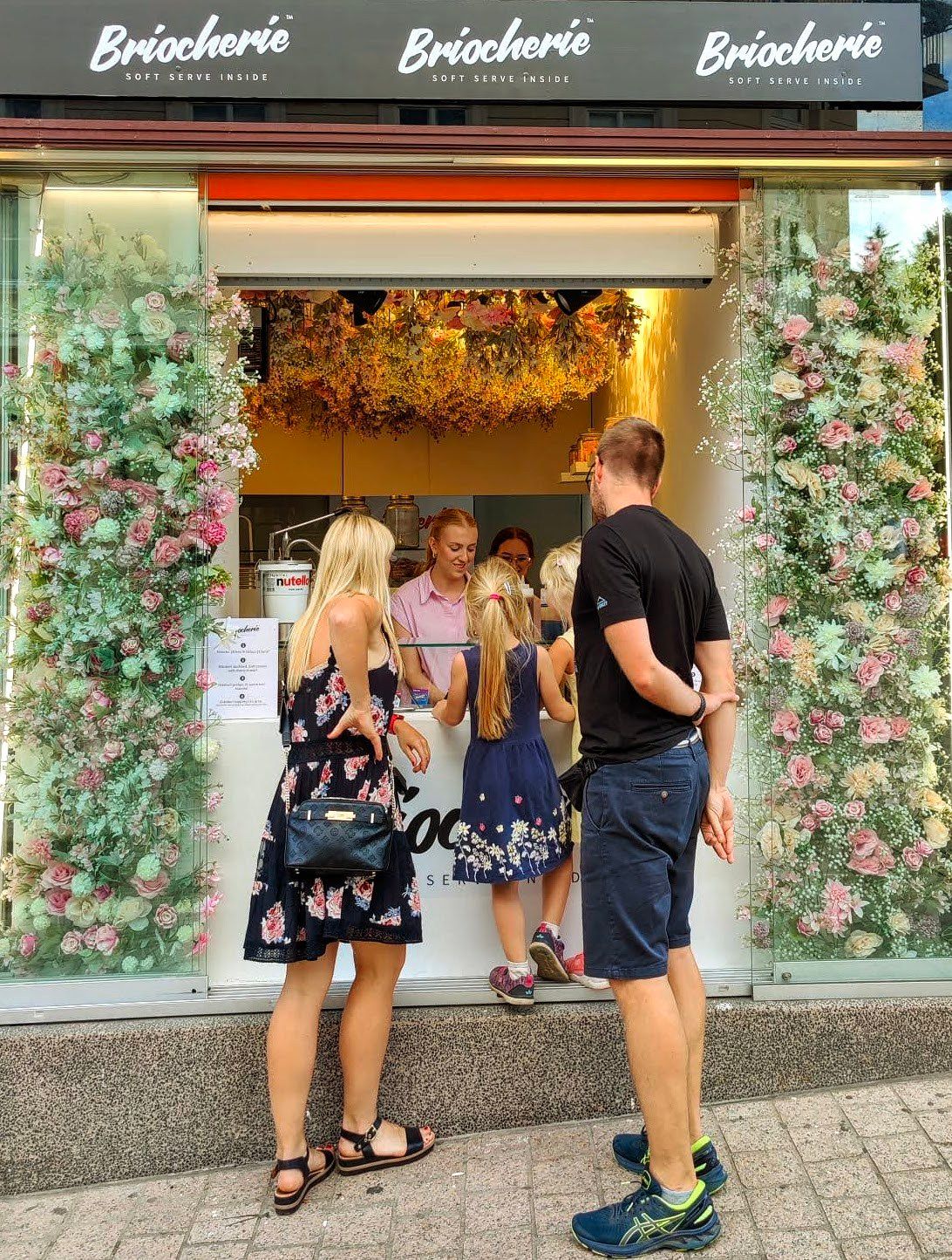
The toppings were REALLY interesting, and a throwback to my childhood, to be added to a brioche and choice of ice cream. An unusual combination at the best of times, but add in my choice of Gummi Bears and...
You know what, it worked. And I have to confess, it was mildly addictive. I was back the next evening for my second brioche, with mixed ice cream, topped off with Kit-Kat.

Meet the latest addition to the Zagreb culinary scene, Briocherie, which opened its doors in the centre a few days ago. Located at Bakaceva 5, between Sol and Ficlek, on the street between Ban Jelacic Square and Zagreb Cathedral, Briocherie actually made its debut at Advent in Zagreb's Fuliranje in 2019, where it was a major hit with queues up to an hour.
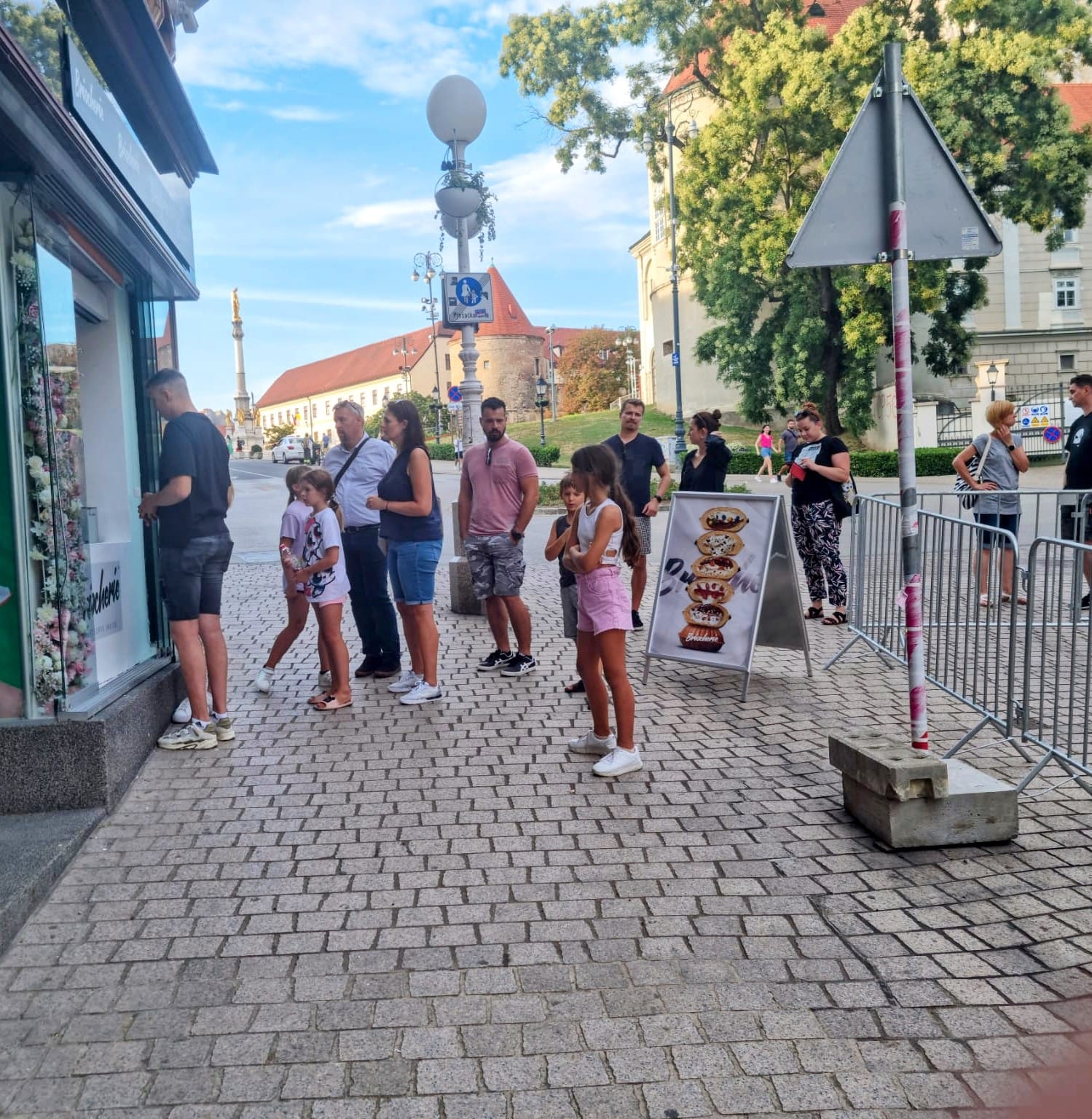
Zagreb is quiet at this time of year, so get in early before the crowds, although it seems that there are already some celebrity regulars. Celebrated chef Mate Jankovic is already in love with Briocherie, posting on his Facebook profile:
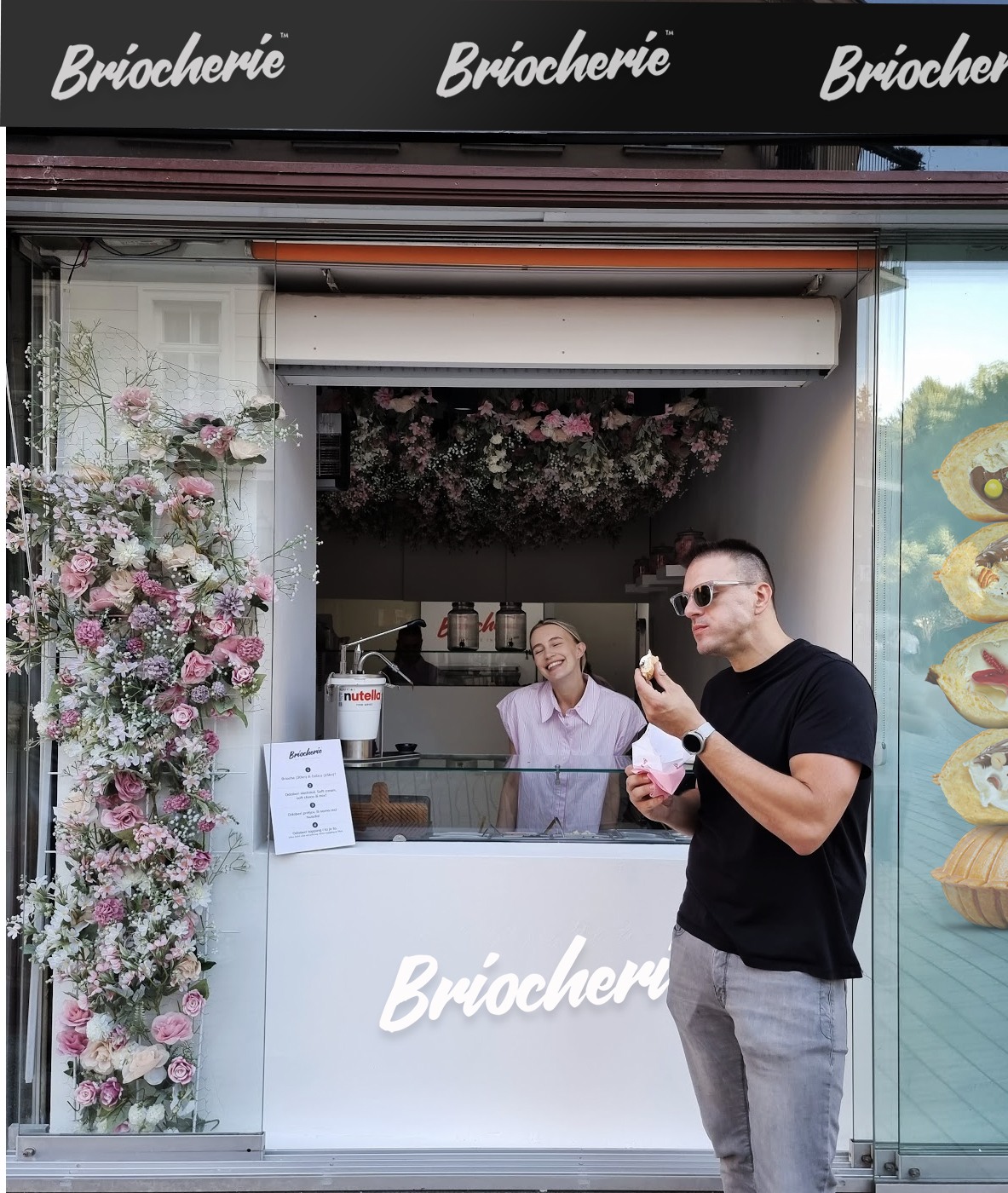
Perhaps the best thing that has happened lately is the opening of Briocheria at Bakačeva 5 in my neighborhood. I love that concept and the creative possibilities it offers, I mean who doesn't love a top ice cream locked in a nice, warm, crispy brioche pastry. Even if you throw in various accessories and textures, the thing is incomparably more interesting. I'm only sorry because I didn't think of it first. Admittedly, if I did, I would eat a lot more of them, this way I limited myself to only a few a week. My kid kills me every day to take him. I watch him enjoy and chew, which makes my pain much worse.
It's that good.

The brioche combination is optional, and the ice cream with toppings and sauces in a cup is also well worth investigating, made as it is from Carpigiani machines, the Rolls Royce of ice cream machines.
I must confess that I have never come across anything like it, and I am sure it will be a hit for some and perhaps not so for others. But if you are in the centre why not give it a try and let me know what you think.
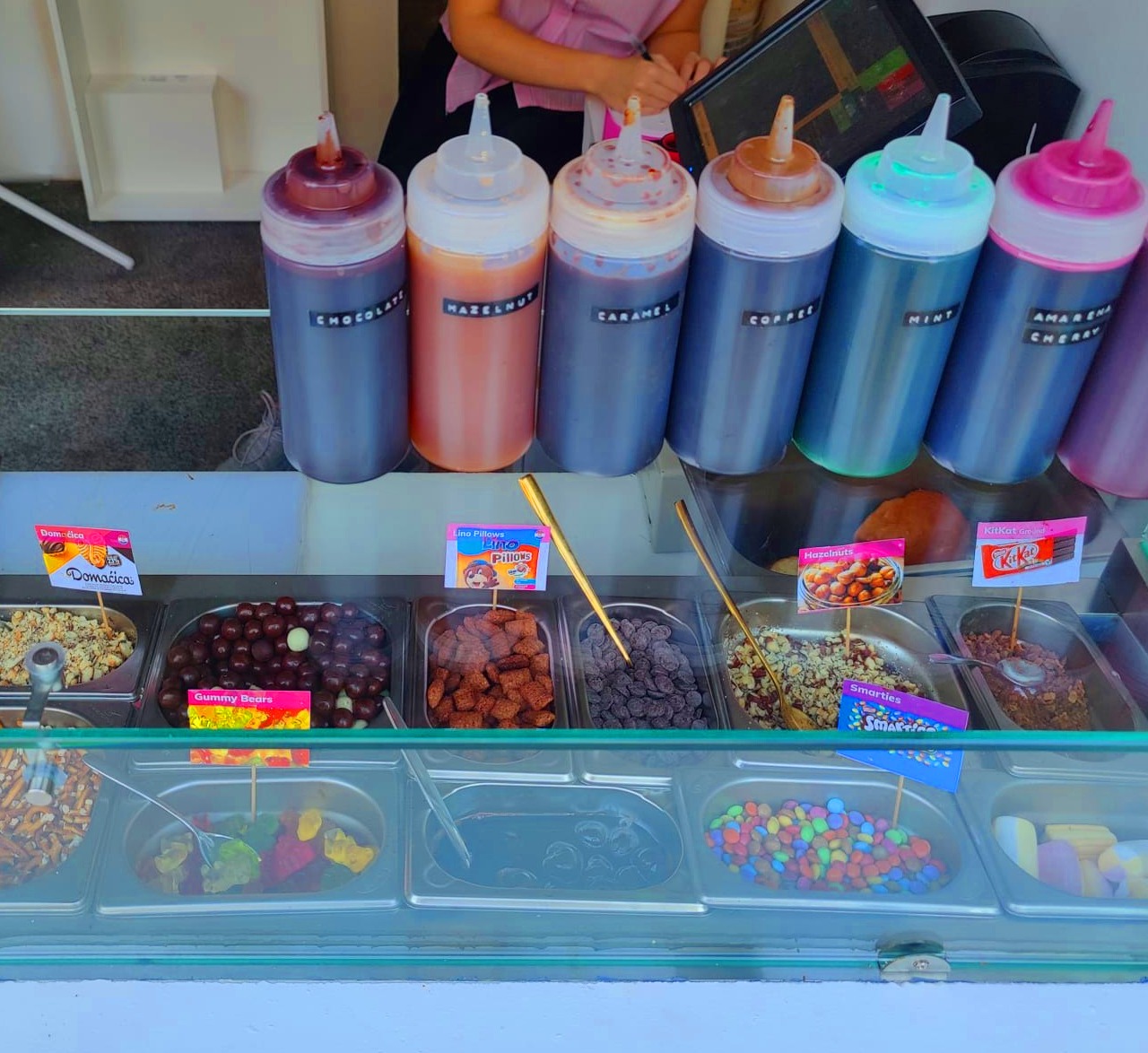
Open daily from 15:00 to 22:00, and you can follow the story on the Brioche Facebook page.
Swimming For All: A Deer Goes for a Dip on Hvar
August 6, 2022 - It is not just locals and tourists heading into the inviting Adriatic on these hot summer days - some beaufitul shots of a deer going for a swim close to Hvar Town yesterday.
Come on in, the water's lovely.
An invitation which has been taken up enthusiastically by millions of tourists and locals on Croatia's Adriatic coast this summer.
But not just people...
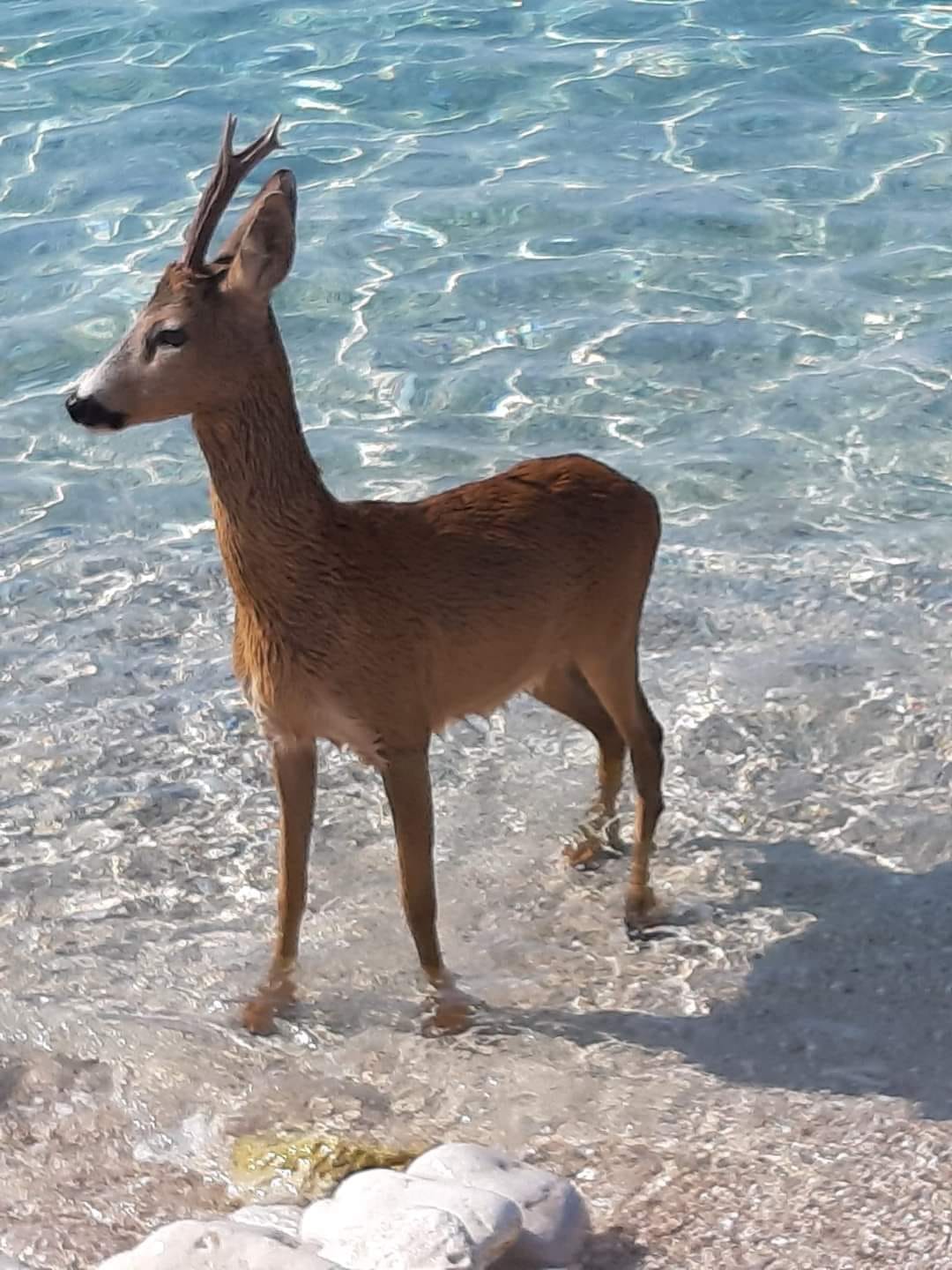
Some lovely shots taken by Nada Kordic Bezic and posted to her Facebook page yesterday, of a deer wandering down to the beach, testing the water, and then going for the plunge.
The impromptu swim took place at Pokonji Dol beach, opposite the small lighthouse island a short distance south of Hvar Town, and the water looked inviting indeed.
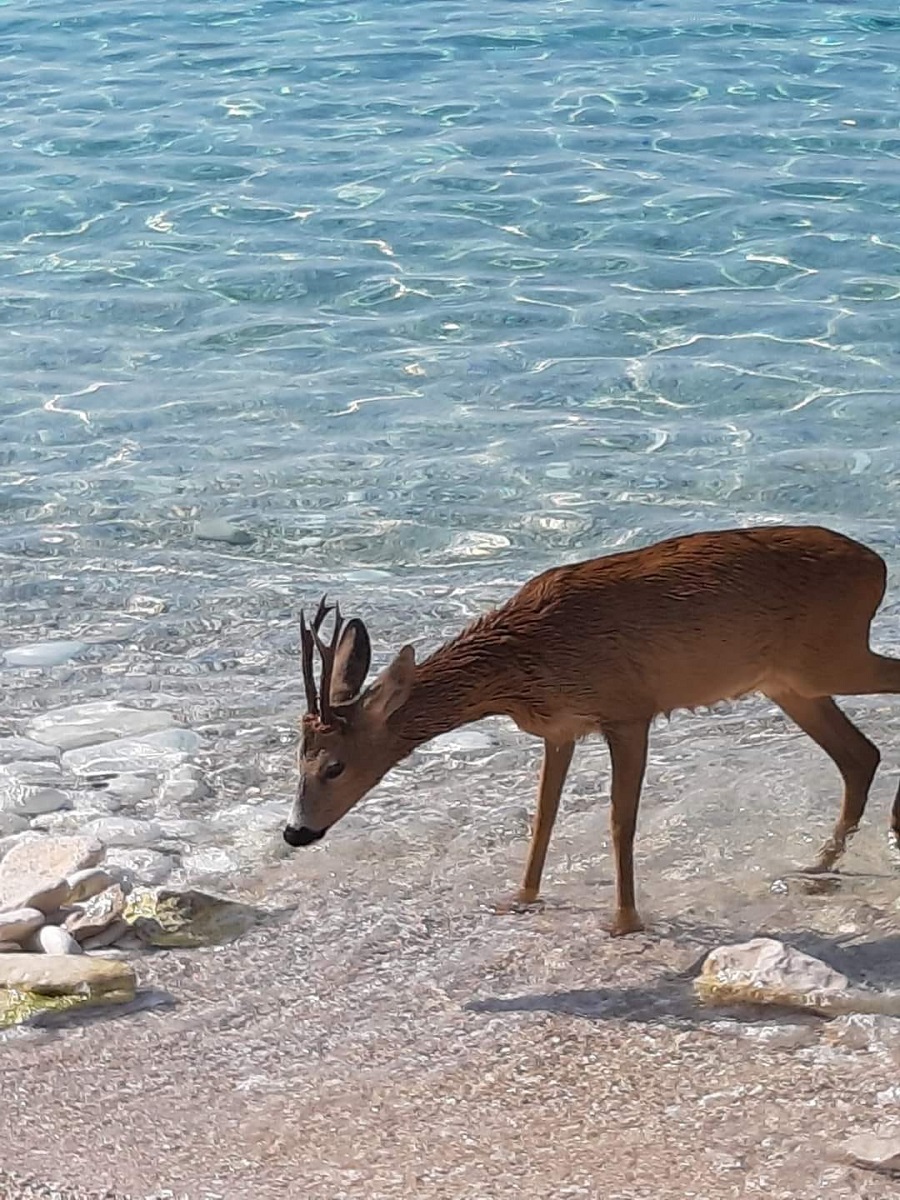
Deer and mouflon can be found on the island, particularly in the hunting grounds north of Hvar Town, on the Pelegrin Peninsula, as can wild boar.
My own personal encounter with wild boar came on the drive back from the Sucuraj ferry late one night, when a few boar came from nowhere to cross the road. One ran straight into the front of my car, twisting the metal, although I think the boar came off worst. I wanted to stop, but there were several other angry boar behind.
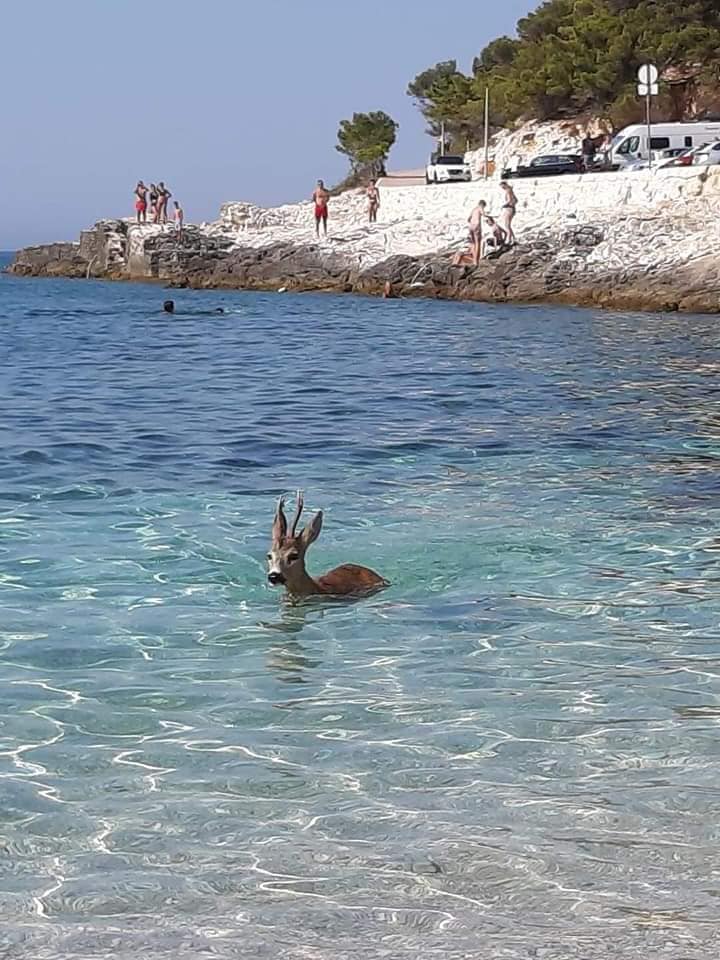
And just like this deer, wild boar can turn up in the most unlikely places, so keep your eyes peeled.
While dolphin sightings are quite common, keep your eyes out for some more unusual creatures in the water, such as wild boar, occasionally - here they are swimming from Brac to the mainland a few years ago in the video below.
Summers on Hvar - why would you holiday anywhere else?
To learn more about Hvar Town, check out the Total Croatia Hvar in a Page guide, or click here for the latest news from Croatia's premier island.
PM: Defenders are Cornerstone of Freedom, Democracy; Accusations won't be Tolerated
ZAGREB, 5 August, 2022 - Prime Minister Andrej Plenković said on Friday, on the occasion of Victory Day, that Croatian defenders were the cornerstone of Croatia's freedom and democracy and that the government would not tolerate attempts to question the fact that the Homeland War was just and legitimate or accuse its war heroes.
"Croats were not in charge of their own destiny for almost 900 years but lived in their territory under various foreign rulers and alien regimes until, at a time of tectonic changes in Europe, owing to the vision of President Tuđman and the courage of Croatian defenders and the unity of the entire Croatian people, we won the right to freedom and the right to our own state," Plenković said in Knin, at the central event marking Victory and Homeland Thanksgiving Day and War Veterans Day and the 27th anniversary of Operation Storm.
Operation Storm was a combined military and police operation that ended a Serb armed insurgency in August 1995 and restored Croatian sovereignty over occupied central and southern parts of the country, paving the way for the peaceful reintegration of eastern Croatia in January 1998.
Operation Storm enabled victory in Homeland War, peace in BiH
Plenković said that the magnificent victory in Operation Storm was decisive in making it possible for Croatia to win an imposed war and restore its constitutional and legal order throughout its territory.
Operation Storm also enabled peace in Bosnia and Herzegovina and made it possible for Bihać to avoid a genocide unlike Srebrenica, and it also enabled the Dayton-Paris peace agreement, he said.
The government will insist on the protection of constitutional rights of the Croats in Bosnia and Herzegovina, the PM said, adding that "there can be no European Bosnia and Herzegovina until all its citizens, particularly Croats, who are often outvoted and disenfranchised, are legitimately and democratically represented in the country's executive and representative bodies."
Preconditions for that are a fair election law and a better functioning of the BiH Federation entity, he said.
Serbia's accusations about expulsion false, futile
In a message to Serbia, Plenković said Croatia would continue to work on peace, good neighbourly relations, stability and dialogue but also expected its neighbours to do the same.
Croatia will not tolerate questioning the character of the Homeland War as a just and legitimate war and it will not allow indictments against its war heroes, he said.
"There have been attempts lately again to malign Croatia with false and futile accusations about the expulsion of Croatian Serbs in 1995 even though it is well known that the leadership of rebel Serbs had forced them, in collaboration with Belgrade, to leave Croatia, as confirmed and proven with documents at the Hague war crimes tribunal by Serb indictees who repented their actions," Plenković said.
He said Serbian indictments against Croatian pilots and Serbia's expanding its jurisdiction to other countries were unacceptable.
The more so as it comes from a country which launched aggression against Croatia and is still not showing true readiness to acknowledge its responsibility "for the criminal enterprise of the Milošević regime," said Plenković.
Investing in security needed more than ever
Given the current geopolitical situation, it is important to invest in security more than ever because the war in Europe has upset the security balance and its impact on the economy, finance, energy and food in Europe and the rest of the world is evident, he said.
"That results in the weakening and destabilisation of fragile and vulnerable states, in poverty and hunger and new migration waves. Even though 27 years have passed since the end of the Homeland War, this is a warning that we must continue to strengthen our defence capabilities," Plenković said, stressing that Croatia set aside HRK 7.6 billion annually for defence.
He noted that his government was leading Croatia at a time of crises - from the coronavirus pandemic and earthquakes to the financial, energy and economic crises, but that it was weathering them while managing to maintain political stability, ready to intervene to the benefit of citizens and the business sector.
The government will continue doing so in order to prevent social fracture and strengthen the business sector, in line with the principle of modern sovereignism and respecting the sacrifice of Croatian defenders, Plenković said.
Milanović: Croatia's Journey was Difficult, It Didn't Get Anything for Free
ZAGREB, 5 August, 2022 - Croatia had a difficult journey and did not get anything for free, President Zoran Milanović said on Friday, in an address at the central ceremony marking Victory and Homeland Thanksgiving Day and War Veterans Day, with his speech focusing on the status of Croats in BiH and the 1995 exodus of Croatian Serbs.
"Croatia had a difficult journey and did not get anything for free, but at a high price, with high interest. We were aware that this country was important only to us, that we were the only ones to really care about it and that everyone else was just an observer," Milanović said in his address at the central event celebrating Victory Day in Knin.
Croats in BiH disenfranchised, Croatia accused of a criminal enterprise
Speaking of the status of Croats in Bosnia and Herzegovina, Milanović said that almost 30 years of waiting, working, trying to negotiate, fighting, of futile beliefs, disappointment and anger, including moments of despair, had passed.
"That Croatia is a guarantor and signatory of the Dayton peace agreement needs to be constantly reiterated, but that is not enough. The people who gave their lives and health for Croatia expected more - they expected our country to also be an instrument to achieve our goals and just aspirations and to use it whenever necessary," he said.
"The Croat people in Bosnia and Herzegovina are not only disenfranchised, they are insulted, and the people who led this country are also insulted, while Croatia is portrayed as the originator of a joint criminal enterprise. This is being done by the same people who received the highest decorations from Croatia and its presidents for cooperation during the war," Milanović said.
One uses the opportunity to do harm to the weaker ones, to disenfranchise them. We have seen this many times in our history, and Croatia has to oppose that, he said.
"Our country is not a passive observer, it is an active member of the international community. We did not join the EU and NATO to be happy beneficiaries of European funds, but to use our state and the instruments available to it for our own interest, including to defy those who want to devalue us," said Milanović.
Croatian Serb exodus due to short-sightedness, arrogance of those who refused Z4 plan
Speaking of Operation Storm and the exodus of Croatian Serbs, Milanović said that it was indeed a human tragedy but that it was a result of "the greed and stupidity of the power-holders from Belgrade, the short-sightedness and arrogance of those who in the days ahead of Operation Storm did not want to agree to the Z4 peace plan."
He recalled that the international community's plan was not favourable for Croatia, yet the Croatian leadership was ready to accept it at the end of July 1995, even though the move would have been criticised.
Operation Storm was a great risk even though today it looks simple and routine, but it should be known that the Croatian army at the time did not have ammunition for more than two weeks of combat and had to act quickly and save people in the conditions of an international embargo and constant fear from sanctions, he said.
"That's why today, when I listen to lies about Croatia having some sort of plans or an agenda in Bosnia and Herzegovina, I want to make things clear. The Croatian army did not facilitate the Dayton agreement, that agreement would never have happened without the Croatian army," said Milanović.
He recalled that the Bosnian Serb army did not surrender, but was crushed by the Croatian army. "Not only have we not even been thanked for that but to this day we have been suspected of being occupiers and having bad intentions."
The Dayton agreement is an agreement on the division of power and authority which, as a pledge of peace and an end to war, legally and politically defined who gets what with painstaking precision, he said.
Croatia is no longer hostage to anything, on the right side of history
"Today, that is being shamelessly devalued and we must oppose that. We are doing that by peaceful means, in a civilised but vocal way," he said, adding that the arguments and instruments are on Croatia's side and that Croatian rights must be respected.
Milanović pointed out that Croatia has its obligations and must invest in the army, whose task is to defend the homeland. "The older, more experienced, more cautious I am, the more inclined I am to interpret that task as conservatively as possible - the closer to home, the better," he added.
He recalled that Croatia "kept silent for the first five years after Operation Storm" because it was blackmailed, pressured and had to send its best people to The Hague, but today it is no longer a hostage to anything, aware that the right values and justice are on its side and that it is on the right side of history.
"Our merits and achievements are great, our faults are inevitable as in any human activity, however, we have nothing to be ashamed of. I believe that the people who gave their lives for Croatia would not be unhappy today," Milanović said.
A Closer Look at the UNESCO Lace Traditions on Pag
August 7, 2022 - Having recently visited the island of Pag, as one of my summer stops, I discovered an old tradition that can be seen throughout all the nooks and crannies of Pag town – a quiet and historic destination worth visiting! All things lace can be found around the small town, whether it be on the town’s streets, tourist shops, or inside Pag’s Lace Gallery.
Lacemaking, a cherished tradition in Croatia known as ‘teg’, has been recorded throughout the Mediterranean in the mid-fifteenth century – when small rural communities left a cultural heritage to be passed down generations. The renowned folk-art form has seen patience and skill from women unlike anything else, as their hard-working hands are well acquainted with the delicate lace we now see on the streets of Pag.
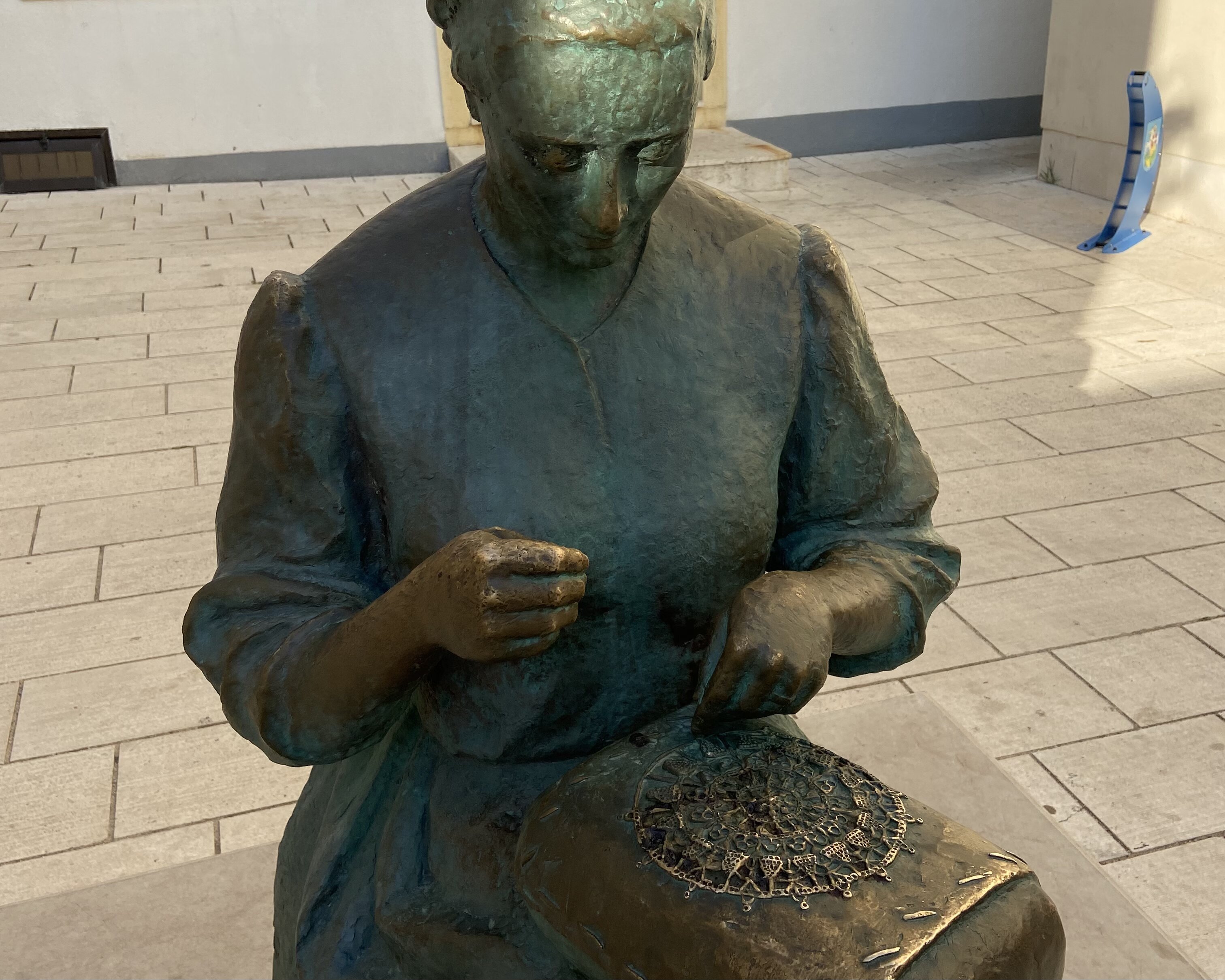
Photo: Ailin Khassen
Such beauty requiring an ordinary mending needle and thread, as well as a backing – which is usually a hard stuffed pillow – is created by intangible designs; known to have been handed down from generation to generation. However, it is very likely to find each lace maker adds her own personal touch to her special lacework.
The lace, having been seen as a design on clerical vestments and national costumes (specifically the blouses and headgear, called ‘pokravica’), has now become known as a stand-alone item. Most commonly, it is utilised as a decorative item, such as an adornment on furniture; an embellishment framed and mounted on walls; a detail sewn onto articles of apparel, and hems of curtains and tablecloths.
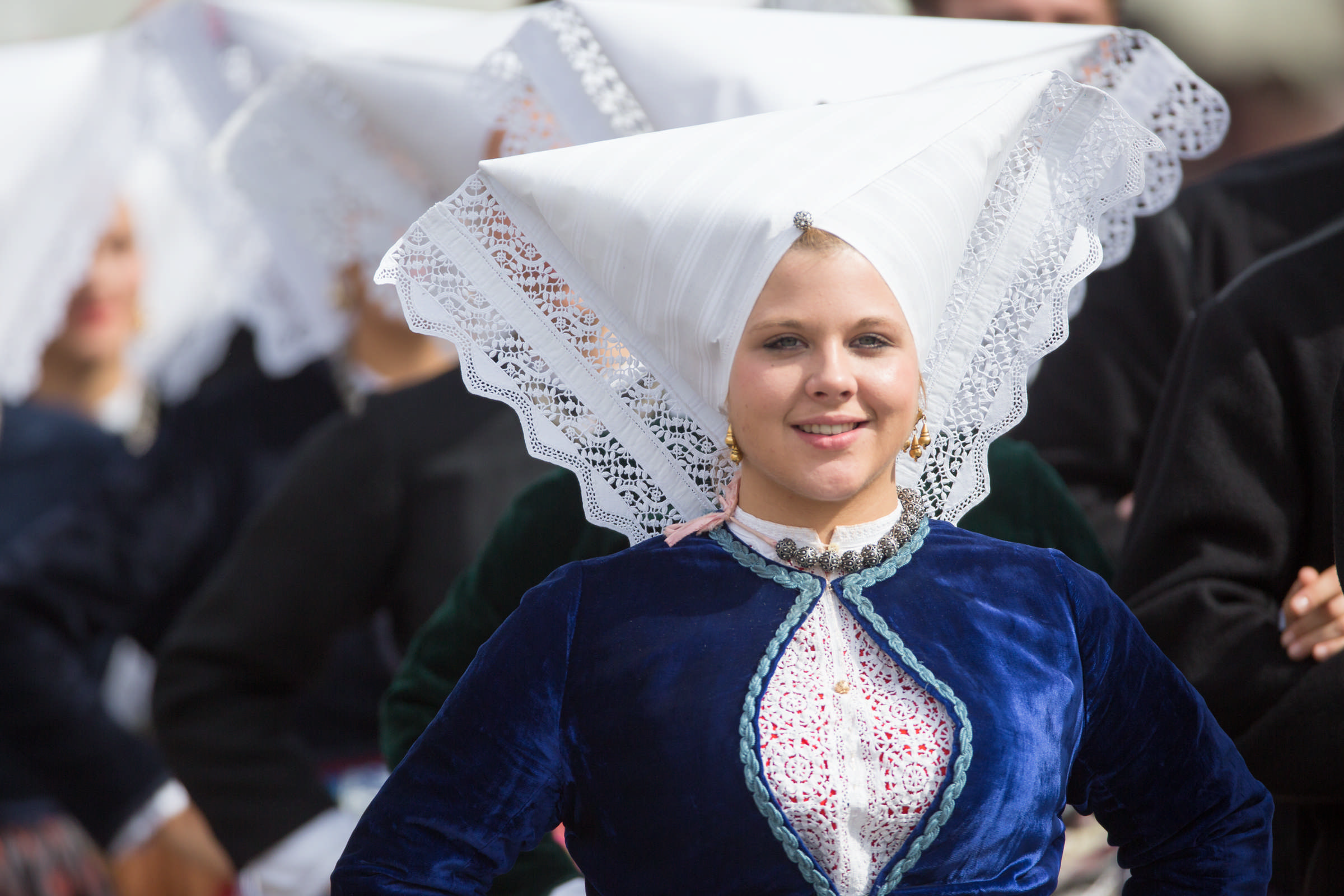
Photo: Romulic & Stojcic
This painstaking work became renowned and diversified due to the admiration it got many years ago. In 1937, Pag’s lacework has received the gold plaque for high-quality handcraft at the World Exhibition in Paris – aiding in the demand it has seen over the years. Moreover, it is known that Empress Maria Theresa kept a lacemaker from Pag at the court in Vienna. To add, in 2009, these tiny works of art have been registered in the list of intangible cultural heritage by UNESCO – along with the lace in the island of Hvar and the town of Lepoglava!
Therefore, this precious lacemaking tradition is widespread and cherished by many in Croatia. To protect this handiwork, the Town of Pag, with the State Intellectual Property Office, has decided to implement the act of signing a license agreement when wanting to commercialise or use the lace of Pag for souvenirs, and clothing and other items. “With this act, we pay tribute to Pag lace and choose who will use it and in what way,” the director of the Pag Tourist Board, Vesna Karavanić, told HRT.
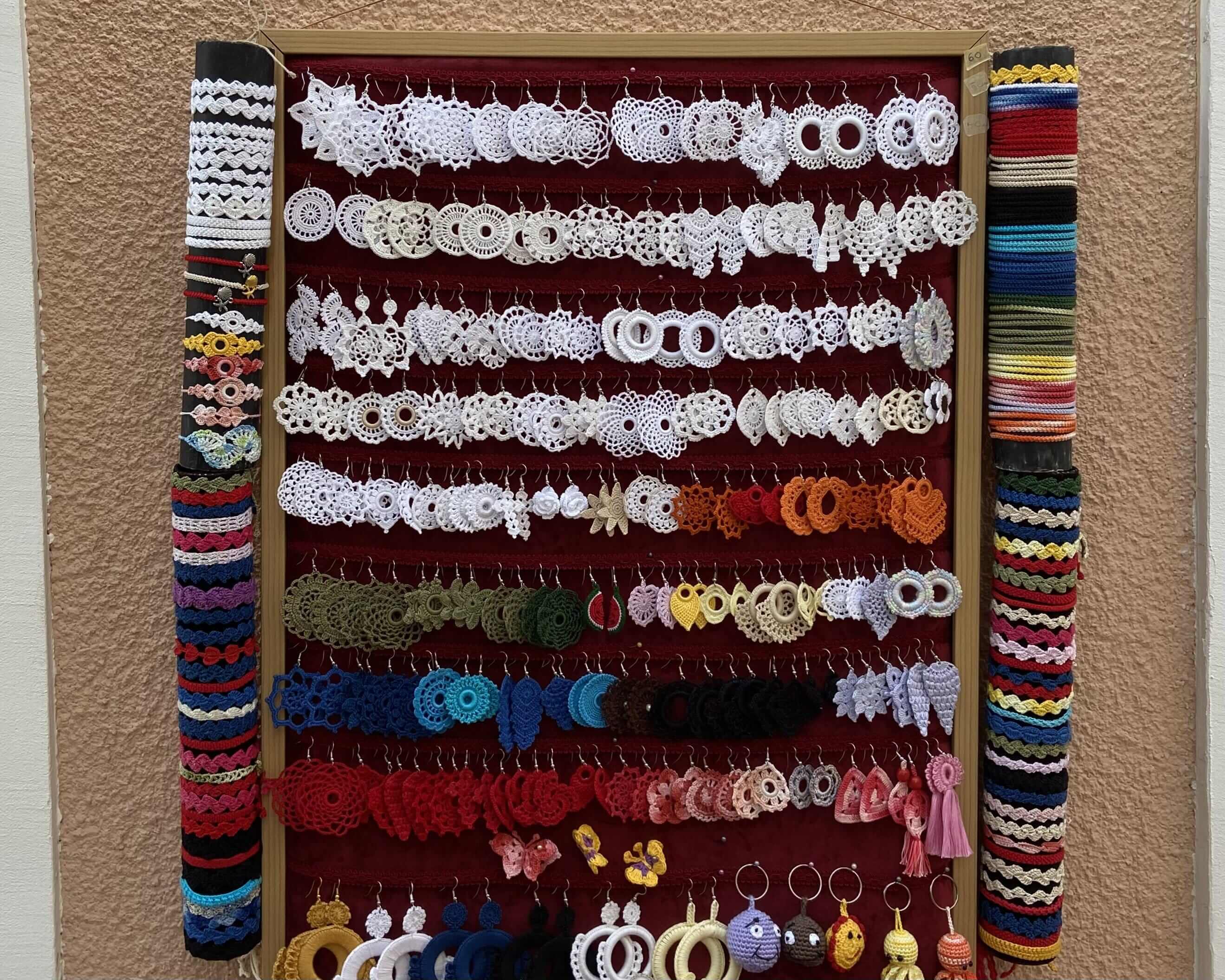
Photo: Ailin Khassen
With the word of beauty and preciseness of the lace of Pag being carried far, it is no surprise that tourists end up purchasing a piece of handiwork in one of the gift shops in the town of Pag. Additionally, it is a true pleasure to visit the Benedictine nuns of the Monastery of Santa Margherita – who keep the lace craft tradition in Pag as strong as it is. A collection of over a hundred exhibits, which have been collected and preserved for over 150 years, can be found in the Monastery as well. So, do not miss the opportunity to stop in the town of Pag to encounter the renowned lace that is as delicate as a snowflake, but durable enough to withstand laundering!
For more on travel in Croatia, follow TCN's dedicated page.
Croatia Logs 1,226 New COVID-19 Cases, 14 Related Deaths
ZAGREB, 5 August, 2022 - Croatia has registered 1,226 new COVID cases and 14 related deaths in the past 24 hours, the national COVID response team reported on Friday.
There are now 9,215 active cases in the country, including 601 hospitalised patients, 21 of whom are on ventilators, while 5,219 people are self-isolating.
Since the beginning of the pandemic, a total of 1,192,305 people have become infected with coronavirus in Croatia and 16,379 of them have died as a consequence while 1,166,711 have recovered.
To date, 59.58% of the total population, or 70.85% of adults, have been vaccinated.
Italian Navy Ship Full of Cadets Visits Split
August 5, 2022 - The Italian navy ship San Giusto arrived this Thursday in Split, more precisely to the Lora Naval Base, where it plans to remain until August the 8th.
The visit is part of the second stage of the Educational campaign for the cadets of the Petty Officer Academy Taranto. The ship was visited yesterday by the mayor of Split Ivica Puljak, adviser to the prefect of Split-Dalmatia Ana Buličić Krespi, consul general of the Republic of Italy in Rijeka Davide Bradanini, honorary consul of Italy in Split Maja Medić, honorary consul of Italy in Dubrovnik Frano Bongi and military attaché of Italy in Vienna with the delegate for Croatia, Colonel Gerardo Contristano. The guests were welcomed by the ship's commander, Antonio Giuseppe Palombella.
The San Giusto ship is the first and only ship of the San Giusto class, a modernized version of the San Giorgio class, and combines amphibious capabilities with the peculiarities of a training ship. Its usual duty station is the Brindisi Naval Base and it is under the direct purview of the 3rd Naval Division. According to NATO standard names, it is defined as an LPD (Landing Platform Dock). That means it's an amphibious transport unit equipped with a floating dock, designed for the landing of amphibious landing troops in projection operations from the sea.
This ship's high transport capacities make the unit very versatile for humanitarian aid, civil protection, and interventions in the event of natural disasters, in which it has participated several times. The large spaces and accommodation capacities also allow it to be used as a training ship for students of the Naval Academy or Cadet Schools of the Italian Navy. That's why it has been designated for the 2022 Education Campaign for the benefit of the Petty Officer Academy Taranto.
There are 151 students currently sailing on it, 35 female and 116 male, who are sailing the Mediterranean and learning about the naval units and skills helpful in performing various tasks. The campaign started on July 25th from the Taranto Naval Base and will last for about 2 months, with an expected return to Taranto on September 24th. After Split, the ship will set sail for future destinations in the central and eastern Mediterranean.
Unfortunately, Captain Alberto Bertorelli was not seen in Split this time.
Numerous MPs, Mayors, Politicians Attend Knin Commemoration
ZAGREB, 5 Aug (Hina) - A large number of mayors, members of parliament and politicians arrived in Knin on Friday morning for the central celebration of Victory and Homeland Thanksgiving Day and War Veterans Day and the 27th anniversary of Operation Storm.
Knin Mayor Marijo Ćaćić told reporters that he could still feel the same excitement as in 1995 when Knin was liberated and the war ended.
"I feel festive today. Twenty-seven years ago my family and I were in Zadar, having been expelled from Knin. It was a great thing for us to return home... It was the beginning of a new life," Ćaćić said.
Šibenik-Knin County Prefect Marko Jelić said the atmosphere at the Knin celebration had become rather formal, comparing it to the atmosphere of seven years ago, when around 100,000 people gathered in Knin. He added that in that context one should be aware of the fact that war veterans were now older and that it was not as simple for them to travel.
"On the other hand, this is also due to disagreements among ourselves. We should be showing unity because we would not have Croatia today if we had not been united," Jelić said.
Bridge MP Miro Bulj, a member of Croatian forces during the Homeland War, too, called for unity, describing separate wreath-laying ceremonies by state officials in Knin as "a disgrace."
Asked to comment on the fact that war veterans were not allowed into the central square in Knin, where today's commemoration was taking place, he said that that, too, was a disgrace and that he did not know why senior state officials were afraid to let those deserving most gratitude attend the event.
Bridge president and MP Božo Petrov said hot weather was probably the reason why there were fewer people at today's ceremony in Knin than in previous years, but that he would like everyone in Croatia to understand that today was not just a non-working day.
"Today we celebrate our freedom and the victory won in the Homeland War, the moment when Croatia was united. We should pass that on to the next generations in a dignified way," he said.
Split Mayor Ivica Puljak, who was in the company of Zagreb Mayor Tomislav Tomašević, said he was in Knin to remember with pride what Croatian defenders had done for the country's freedom, as well as remember those who had given their lives for peace and freedom.
Vukovar Mayor Ivan Penava attended the celebration in Knin too.
Homeland Movement MP and war veteran Stipo Mlinarić said the Croatian army had defeated the Serb army and the criminal SDS party in the war, and that it had not fought against the Serb people.
He said that 80% of Croatian defenders, former prison camp inmates and disabled veterans, were humiliated because in the past two years they could not enter the venue of the central ceremony in Knin without accreditation.
"(The ceremony in) Knin has been neutralised as a symbol of freedom and has turned into a social event attended by politicians," Mlinarić said.


